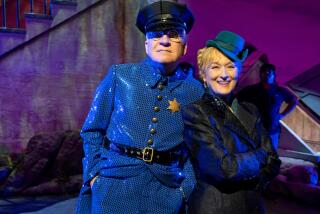STAGE REVIEW : Murder Will Out in ‘Accomplice’
- Share via
Somewhere along the line--specifically with “Sleuth”--the thriller became the fooler, a naked duel between the playwright and the audience as to who could outsmart the other.
“Watch out, she’s got a knife!” In a thriller--by the second act, anyway--you could be pretty sure it was a real knife. In the fooler, maybe not. Maybe “she” was the gamekeeper’s uncle, the one we thought got killed in the first act. Maybe this wasn’t a murder story at all.
Up until its final scene, Rupert Holmes’ “Accomplice” is the wittiest and most accomplished fooler since “Deathtrap.” The last scene is false, but tolerant audiences will go along with it, as was demonstrated Sunday night at the Pasadena Playhouse. Even in its present shape, “Accomplice” will run forever on the dinner-theater circuit.
If Holmes is gunning for a classic, though, he’ll either have to improve that last scene or take it out. Ironically, it’s probably the reason he wanted to write the show in the first place. Having called upon the audience to solve the crime at the end of his previous show, “Drood,” could he now enlist their aid as accomplices?
Not really: People haven’t become that cynical. The scene as it played Sunday night was a fumbled coup de theatre that didn’t seem half as clever as the stuff that had gone before. “Accomplice” calls for footlights, not houselights.
As long as it stays behind the proscenium, it’s as smart as a whip. (Clue.) The scene--the nominal scene--is one of those converted fieldstone farmhouses not too far from London, where the best-laid murders oft go astray.
In this case, the wife (Natalia Nogulich) intends to slip a few drops of poison (nicotine) into her boring husband’s whiskey and soda. But the damn fool (Harry Shearer) doesn’t want a drink this evening. Luckily, the wife has devised a backup plan, involving a foot bath and an electric hair dryer.
(Aside: No, we are not revealing too much of the plot of “Accomplice.” We haven’t come to the plot yet. This is just the preamble.)
Also on the scene--again, nominally--is the wife’s lover (Michael McKean), who is likewise encumbered with a spouse (Pamela Brull.) She may not be as dumb as she looks. Then again, she may be as dumb as she looks, but still in league with somebody.
And away we go. What follows will remind you of “Sleuth’s” and “Deathtrap’s” patternof revoking each scene in the next scene. What’s different is that each scene is also redeemed by its successor. Its little false notes--a bad joke which doesn’t quite play, an anachronism, a too obvious accent--are brought into harmony, now that we see the larger pattern.
Except that we don’t. The method is witty and so are the words that Holmes puts into his characters’ mouths, their accents changing from stage British to backstage American in mid-stream. (Another source for “Accomplice” is “Noises Off,” a hint we won’t enlarge on.)
Thrillers need laughter, and this one has plenty of it.
All that’s lacking is a genuine moment of alarm, the sort of shock that one gets from an old-style thriller such as “Dial M for Murder.” And this seems at hand as the wrong knife slips into the wrong back in Act II. I was quite ready to accept this as the play’s ultimate coup, but Holmes, the overachiever, insists on going beyond it. Give him credit for courage, anyway.
Directed by Art Wolff, the cast is all that can be desired. As with “Sleuth,” there is some doubt about who the players actually are, but the names listed can generally be trusted. Everybody wears several faces, with Shearer stretching the farthest in tonality and Nogulich staying closest to home--not that Nogulich herself would consider dropping poison in anybody’s drink, even during a tough rehearsal. (Clue.)
David Jenkins did the set, which is and is not what it appears to be, and Kathleen Detoro did the costumes, which are meant to read as costumes. Have we been sufficiently obscure? “Accomplice” is great fun, up to a point. Beyond that, connoisseurs will cavil.
Plays Tuesdays-Fridays at 8 p.m., Saturdays at 5 and 9 p.m., Sundays at 2 and 7 p.m. Closes Feb. 26. 39 S. El Molino Ave. Tickets $25. (818) 356-PLAY.
More to Read
The biggest entertainment stories
Get our big stories about Hollywood, film, television, music, arts, culture and more right in your inbox as soon as they publish.
You may occasionally receive promotional content from the Los Angeles Times.










